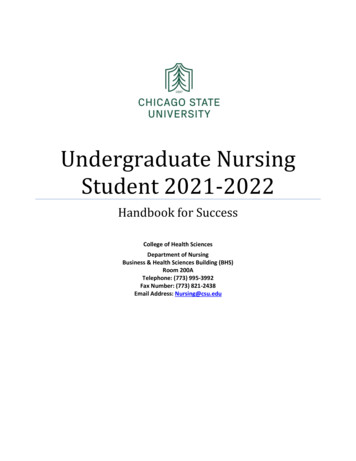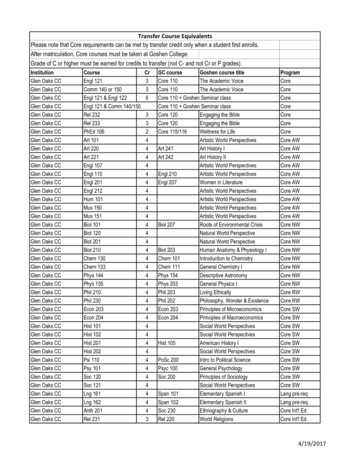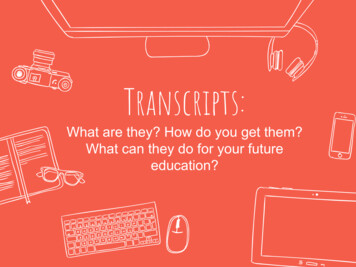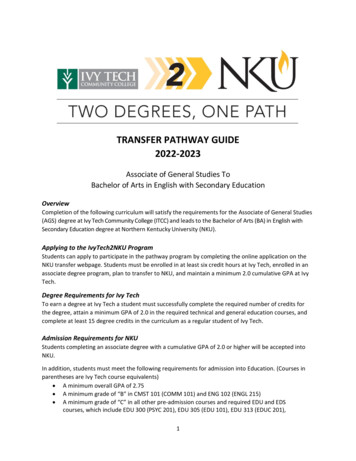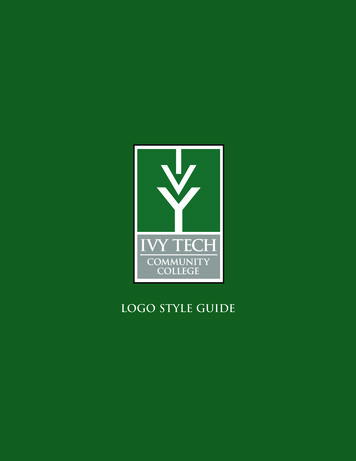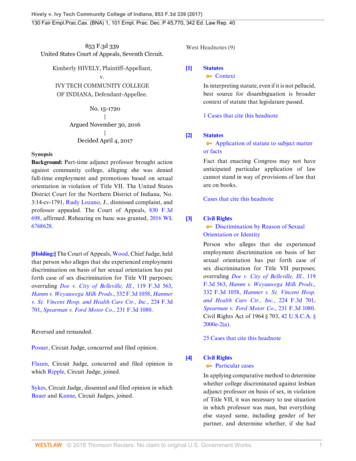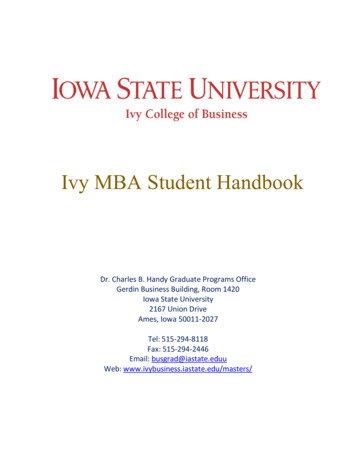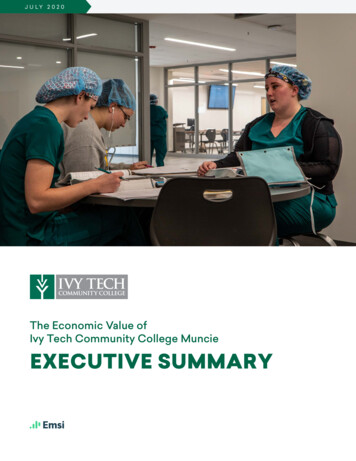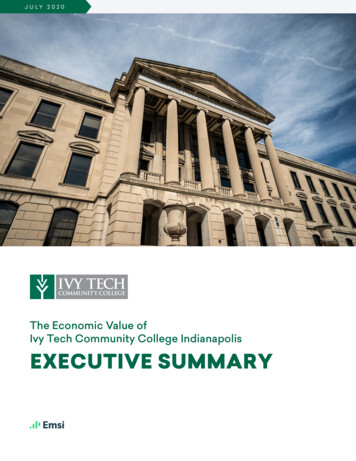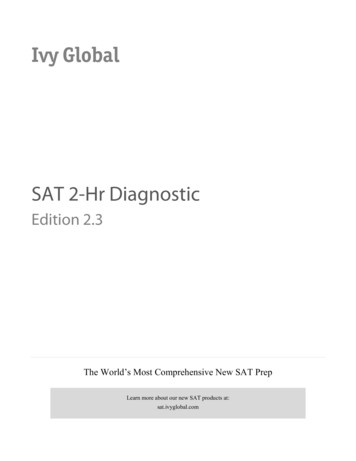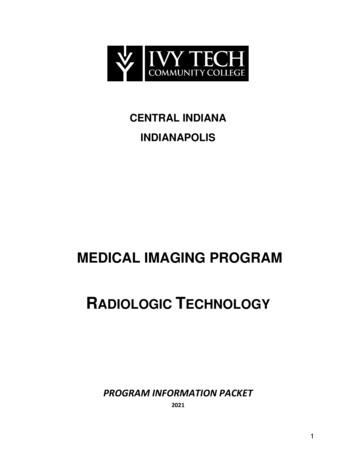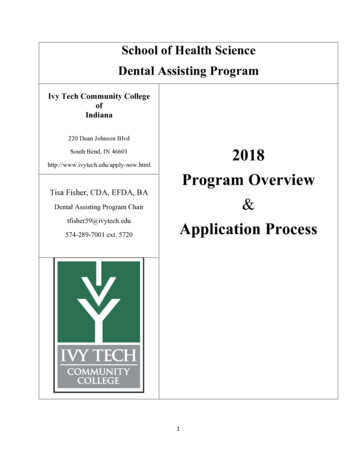
Transcription
School of Health ScienceDental Assisting ProgramIvy Tech Community CollegeofIndiana220 Dean Johnson Blvd2018South Bend, IN 46601http://www.ivytech.edu/apply-now.htmlProgram OverviewTisa Fisher, CDA, EFDA, BA&Dental Assisting Program Chairtfisher59@ivytech.edu574-289-7001 ext. 5720Application Process1
I.DENTAL ASSISTING PROGRAMa. PROFESSIONAL OVERVIEWThe educationally qualified dental assistant today plays a vital role as a member of the dentalhealth team. Didactic, laboratory, and clinical content are included in a one-year academicprogram. Each state has a dental practice act that governs which duties a dental assistant can andcannot perform.b. INTRODUCTIONWelcome to the South Bend Campus of the Ivy Tech Community College. Ivy Tech is the largestcollege in Indiana and the largest community college in the nation. The Dental AssistingProgram is fully by the accredited American Dental Association Commission on DentalEducation. The program is twelve (12) months in length, has a spring start and graduates areawarded Technical Certificate upon completion.The purpose of this application booklet is to explain basic information about the program ofstudy, and the admission process. We encourage you to read this document thoroughly and markany areas that may raise questions and warrant clarification. Please call the School of HealthSciences office at (574) 289-7001 or e-mail Professor Fisher at: tfisher59@ivytech.edu. foradditional information.The Dental Assisting Program has specific ability requirements, which include physical, mentaland technical. A list of those abilities is enclosed with this document. If an applicant hasquestions about these statements, or if the applicant would like to request accommodation forhis/her disability, please contact the Director of the Dental Assisting Program, Professor Fisherat: tfisher59@ivytech.edu.It is important to note that acceptance to the program is separate from admission to the College.Students must be accepted into the college prior to applying to the dental assisting program. Toapply to the college visit: http://www.ivytech.edu/apply-now/ The Dental Assisting Program hasa limited enrollment of 12 qualified full-time students per entering class and begins in the springsemester of each year.2
c. PROGRAM OVERVIEWThe academic portion of the Dental Assisting Program consists of two (2) semesters and one (1)summer session. Most courses are offered in the daytime hours. Clinical experience is an integralpart of the educational experience for all Dental Assisting students. The Dental Assisting Programestablishes affiliation agreements with dental offices in the surrounding community to providestudent-learning experiences. General dentistry offices as well as specialty offices are included asresources.d. Dental Assisting curriculum is presented in a lecture/laboratory format. The lecture presentsprinciples of dental practices, infection control and dental procedures. The laboratory portion ofthese courses provides hands on experience with dental techniques and instrumentation. Uponsuccessful completion of the Dental Assisting Program of study, students are eligible to sit for theDental Assisting National Board Certification Examination. A passing score on this examinationallows the graduate to apply to become a Certified Dental Assisting (CDA).DESCRIPTION OF THE PROFESSIONThe dental profession is dedicated to providing patients with optimum oral health care. Inbecoming a dental assistant, the assistant will be a representative of the profession, andextension of the dentist in his/her practice. The dental assistant must have the ability toperform under pressure in stressful and emergency situations. A stable temperament, astrong sense of responsibility, patience, and concern for detail are required. Manual dexterity andphysical stamina are vital. Most duties require sitting for extended periods of time withbending, reaching, pulling, and pushing occurring repeatedly during a normal eight (8) hour workday. The dental assistant’s full attention and focus is mandatory for the task being performed.e. PROGRAM MISSION AND PURPOSEIt is the mission and intent of the dental assisting faculty to view the educationally qualifieddental assistant as a person who has received specified technical and clinical training that allowsthem to function as a productive and valuable member of the dental health team. Faculty defineeducation as a teaching/learning process whereby the assimilation of appropriate knowledge,skills, and judgment educate a graduate Dental Assistant who is a credit to his/her profession, aswell as successfully completing the National Certification examination. Consistent with thephilosophy of the Ivy Tech College Campus, faculty accepts the responsibility for effectiveteaching of students through a realistic correlation of foundation knowledge with clinicalexperience. Furthermore, faculty feel student’s success is linked to the student extern becomingan integral supporting member of a professional dental practice. The dental assistant contributesto the wellbeing of the patient by professional competency in assisting the dentist in the care ofthe patient in the general, specialty, emergency, and administrative areas of dentistry.It is very important that you carefully read and follow this guide concerning theAdmissions/application process. It is your responsibility to become familiar with theinformation and seek advisement as needed.3
II. APPLICATION PROCEDUREAPPLICATION TO THE COLLEGESTEP1APPLY Complete the Ivy Tech Community College new student application through www.ivytech.edu.After you have submitted a complete application, the applicant will receive information in the mail within7-10 business days. Upon receiving your acceptance letter, the following steps are in order: Apply for financial aid Attend a new student orientation Complete your ACCUPLACER assessment (required)* Meet with an advisor (required)*ACCUPLACER INFORMATIONACCUPLACER is a suite of tests that determines your knowledge in math, reading and writing asyou prepare to enroll in college-level courses. ACCUPLACER is used to identify your strengthsand weaknesses in each subject area and to help you improve your skills through interactiveonline learning tools. The results of the assessment, in conjunction with your academicbackground, goals and interests, are used by academic advisors and counselors to place you in theappropriate college courses that meet your skill level.Scheduling the ACCUPLACER TestAll students must have a current application on file in the Admissions office before schedulingACCUPLACER Test.Preparing for the ACCUPLACER TestWe encourage all students to spend time reviewing the sample test:The ACCUPLACER is free and may be taken up to a maximum of three times per calendar year.Learn more about Accuplacer.Brush up on your skills! The higher you score, the fewer classes you'll have to take, whichwill save you time and money in the long run.Accuplacer Study GuideAccuplacer Sample QuestionsFree Accuplacer Study AppThe Accuplacer is free and may be taken up to a maximum of three times per calendar year.Learn more about Accuplacer.4
STEP 2 ACADEMIC ADVISINGINTRODUCTION: After you have completed the College Application procedure, and havecompleted all recommended Academic Skills Advancement courses, we recommend you meetwith the dental assisting advisor to schedule your dental assisting prerequisite course work. Toschedule a meeting with Tisa Fisher, the dental assisting advisor, call the School of HealthSciences at 574-289-7001 and request an appointment. Your Dental Assisting advisor willassist you in scheduling your Dental Assisting prerequisite courses.DENTAL ASSISTINGPREREQUISET COURSESSemester 1: (Prerequisites classes)#COMM 101Fundamentals of Public Speaking OR#COMM 102Introduction to Interpersonal Communication#ENGL 111English Composition#HLHS 101Medical Terminology#IVYT 112Student Success for HealthcareSemester Total3 credits3 credits3 credits1 credits10 creditsINFORMATION SESSIONSContact the School of Health Sciences for times and dates of Dental Assisting informationsessions.Step 3APPLICATION TO THE DENTAL ASSISTING PROGRAMWhen you have attended a Dental Assisting Information session and completed the requiredprerequisite courses (or you are in the fall semester completing the prerequisite course) you mayapply to the dental assisting program. The application can be found on the final page of thisoverview. Complete the application and return to the School of Health Sciences, DentalAssisting Program on or before the deadline November 9, 2018*** THE DEADLINE IS NOVEMBER 9, 2018 ***NOTIFICATION OF ACCEPTANCENotification of your status will be given by December 29, in the year you apply. Notification ofacceptance or non-acceptance to the Dental Assisting Program will be given via email. Acceptedapplicants will also receive a formal acceptance letter by mail. At that time, accepted applicantswill be requested to sign a statement of commitment to attend the program. This form needs to becompleted returned t to the School of Health Sciences within 7 business days. Failure to returnthe statement of commitment may cause the applicants status to change from accepted tonon-accepted. It is very important to return the commitment statement by the datespecified in the letter.DENTAL ASSISTING ORIENTATIONAccepted applicants will be required to attend a mandatory orientation meeting in January prior tothe start of the spring semester. At this time students will register for spring classes and receiveinformation pertaining to program requirements such as: physical exam and immunizationsforms, CPR information, Criminal background check, drug screen, dress code, and textbooks)(See page 16 of this Overview Booklet for more details)5
III. STUDENT SELECTION CRITERIAThe Dental Assisting Program is a selective admission program. Admission is offered the top 12students who earn the greatest points in the selection process. The remainder of the applicants areplaced on a wait list until the class is full. The following criteria are proposed as the minimumrequirements to be established by Ivy Tech Community College for acceptance into the DentalAssisting Program.1. PREREQUISITE GRADESrades in earned in the required prerequisite courses are assigned points and totaled. Students arerank ordered based on the number of points they earn.Points are assigned to grades as follows:GradePointsABCD,W/WF6 points4 points2 points0 pointsIf multiple attempts are made to complete the prerequisite courses the higher grade of thefirst two attempts will be counted. A grade of W or WF is considered a grade.2. TRANSFER POLICYPost-secondary course work that is applicable to the curriculum may be transferred from otheraccredited colleges on a course-by-course basis provided the student has earned a “C” or highergrade. Official transcripts with general studies courses need to be submitted to the registrar.Transfer students ,in good standing, from other CODA accredited Dental Assisting Programs maybe admitted on a space available basis.IV. ADDITIONAL INFORMATION1. INDIANA LICENSURE REQUIREMENTSIn the state of Indiana requires dental assistants hold a Radiology License to expose x-rays.Graduates of the Ivy Tech Dental Assisting program are eligible to sit for the Radiology Healthand Safety portion of the Dental Assisting National Board which is required for Licensure inRadiology in Indiana. For additional information on licensure requirements for Dental Assistantssee page 20.2. HEALTH HISTORY AND ESSENTIAL FUNCTIONSAll Dental Assisting applicants must have a physical exam within the first month of the springsemester. The physical includes, updated immunizations, tuberculosis skin test and an evaluationof essential abilities. If student have a positive tuberculosis skin test, they will be expected tofollow the advice of their physician. Any student who does not complete the health forms orrefuses to follow the advice of their physician will be withdrawn from the clinical rotations,jeopardizing graduation from the program.6
The Essential Abilities document is provided to give the potential dental assisting applicant adescription of the type of physical/technical abilities necessary to complete the program or workin the typical dental setting. The applicant is encouraged to consider the physical requirements ofthe program, and to make an appointment with the program chair to discuss concerns or requestsfor accommodation for his/her disability. Student with documented need for accommodations areto meet with the campus Disabilities Support Service Representative. See page 213. OCCUPATIONAL EXPOSURES TO BLOODWhat Healthcare Personnel Need to KnowIntroductionHealthcare personnel are at risk for occupational exposure to bloodborne pathogens, includinghepatitis B Virus (HBV), hepatitis C virus (HCV), and human immunodeficiency virus (HIV).Exposures occur through needlesticks or cuts from other sharp instruments contaminated with aninfected patient’s blood or through contact of the eye, nose, mouth, or skin with a patient’s blood.Important factors that influence the overall risk for occupational exposures to bloodbornepathogens include the number of infected individuals in the patient population and the type andnumber of blood contacts. Most exposures do not result in infection. Following a specificexposure, the risk of infection may vary with factors such as these: The pathogen involved The type of exposure The amount of blood involved in the exposure The amount of virus in the patient’s blood at the time of exposureYou employer/clinical site is provided with the Ivy Tech Community College system forreporting exposures in order to quickly evaluate the risk of infection. This may involve testingyour blood and that of the source patient and offering appropriate post-exposure treatment.How can occupational exposures be prevented?Many needle-sticks and other cuts can be prevented by using safer techniques (for example, notrecapping needles by hand), disposing of used needles in appropriate sharps disposal containers,and using medical devices with safety features designed to prevent injuries. Using appropriatebarriers such as gloves, eye, and face protection, or gowns when contact with blood is expectedcan prevent many exposures to the eyes, nose, mouth, or skin.7
DENTAL ASSISTING ESSENTIAL FUNCTIONSFUNCTIONS ABILITY CATEGORY REPRESENTATIVE ACTIVITY/ATTRIBUTEMove within confined spaces of operatory Sit and maintain balanceGROSS MOTOR SKILLSStand and maintain balance Perform full range of body motionFINE MOTOR SKILLSPick up objects with hands Grasp small objects with hands (e.g.instruments) Write with pen or pencil Key/type (e.g., use acomputer) Pinch/Pick or otherwise work with fingers (e.g. transfer,retrieve instruments, materials, and equipment) Twist (e.g., turnobjects/knobs using hands)PHYSICAL ENDURANCEStand, sit, or combination of both for long periods of time (e.g.operative procedure) Sustain repetitive movements (e.g., CPR)Maintain physical tolerance (e.g., work entire day)MOBILITYTwist Bend Reach Stoop/squat Pull/push Move quickly e.g.,response to an emergency) Climb (e.g. ladders/stools/stairs) WalkHEARINGHear normal speaking level sounds (e.g. person-to-person reportHear faint voices Hear in situations when not able to see lips (e.g.,when mask are used)VISUALSee objects up to 20 inches away (e.g., information on a computerscreen) See objects up to 20 feet away (e.g., patient in a room) Usedepth perception Use peripheral vision Identify color changes inskin Distinguish color intensity (e.g. flushed skin, paleness)READINGDetect odors from patients (e.g., foul smelling oral cavity) Detectsmoke Deter gases or noxious smellsRead and understand written documents (e.g., policies/protocols)Read digital displays (steam autoclave)FUNCTIONS ABILITY CATEGORYREPRESENTATIVE ACTIVITY/ATTRIBUTESMELLARITHMETIC COMPETENCETell Time Use a calculatorEMOTIONAL STABILITYAdapt effectively to environments with high tension to insurepatient safety Respond quickly and in an emotionally controlledmanner in emergency situations Provide emotional support to thepatient and attend to the needs of the patient Maintain composurewhen subjected to high stress levels Focus attention on task Performmultiple responsibilities concurrentlyANALYTICAL THINKINGTransfer knowledge from one situation to another Processinformation Problem solve Prioritize tasks Use long term memoryUse short term memoryCRITICAL THINKINGIdentify cause-effect relationships Plan/control activities for othersSynthesize knowledge and skills Sequence informationINTERPERSONAL SKILLSNegotiate interpersonal conflict Respect differences in patientsEstablish rapport with patients Establish rapport with co-workersCOMMUNICATION SKILLSTeach (e.g., patient/family about dental health care) Explainprocedures Give oral reports (e.g., report on patient’s condition toothers) Interact with other (e.g. dental health care workers) Speakon the telephone Influence people Direct activities of others Conveyinformation through writing8
V. CURRICULUMCURRICULUMTechnical Certificate One-Year Program of Study SequenceSemester IFallPrerequisitesENGL 111CourseCreditsEnglish Composition3COMM 101/orFundamentals of Public Speaking/or3COMM 102Introduction to Interpersonal Communication-HLHSS 101Medical Terminology3IVYT 112Student Success for Healthcare1DENT 171*Introduction to Dental Terminology*3*Recommended, not requiredContact Hours (perweek)10/13Semester II,SpringDENT 102Dental Materials & Lab I34 lecture/4 labDental Materials & Lab II34 lecture/4 labPreclinical Practice I42 lecture/4 lab22 lecture/2 lab33 lecture1.5 lecture/1 lab8 weeksDENT 1298 weeksDENT 11516 weeksDENT 116Dental Emergencies/Pharmacology8 weeksDENT 123Dental Anatomy8 weeksDENT 128Coronal Polishing and Caries Prevention8 weeks169
Semester IIISummerDENT 125Preclinical Practice II34 lecture/4 labDENT 122Clinical Practicum I13 clinicalDENT 118Dental Radiology42 lecture/2 lab8Semester IVFallDENT 130Clinic II5DENT 132*Expanded Functions for Dental Assistants3DENT 117Dental Office Management23 hours lecture22 lecture/2 labDENT 124Preventive Dentistry & Nutrition12* indicates a non-required course1024 hours externship1 hours lecture/4 hourslab
VI. STUDENT RESPONSIBILITIES1ACADEMIC INTEGRITYAt Ivy Tech Community College, learning is valued and honored. Our learning community cannot thriveif its students copy the work of others, known as plagiarism, and seek an unfair advantage over theirfellow students by cheating. The academic standards of Ivy Tech Community College are based on agenuine pursuit of knowledge and demand a high level of integrity from every one of its students.When this trust is violated, the learning process suffers injury and steps must be taken to ensure thatlearning standards remain meaningful. Cheating and/or plagiarism are grounds for immediate dismissalfrom the College. All students are encouraged to avoid dishonest behavior and seek available tutorial andcounseling services to help them succeed. (Please see current Student Handbook, for further details).STATEWIDE CONDUCTThe reputation of the College among the community depends, in large part, upon the behavior of itsstudents. Students enrolled in the College are expected to conduct themselves in a mature, dignified andhonorable manner. Students are entitled to a learning atmosphere free from discrimination, harassment,sexual harassment and intimidation. This applies to all conduct among faculty, staff and students.Students are subject to college jurisdiction while enrolled at the College. The College reserves the right totake disciplinary action against any student whose conduct, in the opinion of college representatives is notin the best interests of the students, other students, or the College. Students who are disciplined shouldexpect to find their sanctions enforced at other Ivy Tech campuses. (Please see current Student Handbook,for further details)ATTENDANCE POLICYAttendance at scheduled class meetings or other required activities is essential. Instructors establish andenforce attendance policies, maintain attendance records, and excuse student only for bona fide reasons.Satisfactory attendance is necessary to achieve educational objectives and maintain financial aid andveterans’ benefits. (Please see current Student Handbook, for further details)Within the DA program, students are expected to attend all classes, laboratory sessions and clinical.Should a student be absent from 10% of the class/clinical activities per semester, they will receive awritten warning as documented on the Student Status Report. Should a student be absent from 20% of theclass/clinical activities per semester, they may be dismissed from the program due to potential patientsafety issues.DISCIPLINARY ACTIONCases of student misconduct and/or lack of academic integrity are to be referred to the Program Chair,then to the Dean of Health Sciences and finally to the Vice Chancellor of Academic. A student whoviolates the rules and regulations of the College may be subject to disciplinary actions, which mayinclude, but not limited to the following.11
1.2.3.4.5.Verbal reprimandRestitution for damagesRestriction of privilegesFailure of the assignment or courseWithdrawal from a course, program or the College for the remainder of the semester orterm6. Suspension from the College for one calendar year7. Dismissal from the College for five yearsStudents are provided an opportunity to appeal any disciplinary decision and are required to sign a waiver ifthey choose to waive the right to appeal. (Please see current Student Handbook, for further details)DUE PROCESS (STUDENT GRIEVANCE PROCEDURES)The student grievance process is an appropriate mechanism to deal with violations of student rules ofconduct and conversely allows a student with a disagreement to grieve against a college employee’sdecision affecting the student. The College encourages students to resolve their complaints informally. Theinformal grievance procedures are designed to accomplish a quick and effective resolution. The Collegeformal grievance procedure is also available.If you have problems with a class (regardless if it is general education or professional course), thefollowing is a list of individuals you will need to meet with to discuss your grievance issue. You must meetwith these individuals in the order listed. If the issue is resolved, you will not need to see the next person.You must make an appointment to speak to the following individuals:1. Instructor of course2. Program Chair for the program/course3. School Dean for the program/course4. Vice Chancellor of Academic AffairsPlease refer to the Ivy Community College-South Bend, current Student Handbook for further informationconcerning this -Student-Handbook-Statewide.pdfRE-ADMISSION TO THE PROGRAMIf a student is dismissed from any campus/region of Ivy Tech Community College, that individual isdismissed from the College. (Please refer to the current Student Handbook, for further details.)12
VII.FINANCIAL INFORMATIONFINANCIAL AIDIvy Tech Community College offers a variety of financial aid programs to students whoneed assistance to continue their education The College Financial Aid Office administersmost programs for federal, state, and institutional aid under specific policies andguidelines. Eligibility for most financial aid at the College is based upon the student’sdemonstrated financial need. Students seeking financial aid are required to complete theFASFA form by the first week of March.13
4 /23/10Ivy Tech Community College of IndianaCriminal Background Checks and Drug ScreeningSchool of Health SciencesApproved by Regional Academic Officers May 4, 2010Background:The purpose of requiring criminal background checks and drug screenings on students who will havedirect patient contact within a health care facility or laboratory is to ensure patient safety and protection.By doing so, students meet the same standards as health care facility employees. Individuals receivingcare are often physically and emotionally vulnerable. Students have access to personal information aboutthe patient and/or his/her family, access to the patient's property, and provide intimate care to the patient.Health care facilities are obligated to document that any individual authorized to provide such care doesnot have a criminal history of use of illegal substances or illegal use of pharmaceuticals, mistreatment,neglect, violence, defrauding the public, or otherwise taking advantage of another person.For the purposes of this document, “clinical” refers to any type of course in which the student may havepatient contact as a part of the course, regardless of actual course title or location of the patientinteraction. Other examples of relative course titles include internship, externship, clinical practicum, etc.Implementation:Effective August 4, 2010, criminal background checks and drug screenings will be required for allcurrently enrolled clinical students and newly admitted students in School of Health Sciences’ programs.Some regions will have already implemented the practice of requiring criminal background checks anddrug screenings for some or all students in School of Health Sciences programs, due to the requirementsof clinical affiliates. The implementation of a statewide policy will provide consistency for Ivy TechSchool of Health Sciences programsCompletion of a criminal background check and drug screening are required for admission and/or clinicalplacement in Health programs. The criminal background check and drug screening may be done eitherbefore enrollment in the professional courses or just prior to the first day of clinical or externship (thetiming will vary among programs, based upon when in the curriculum sequence the students will first beinvolved with patients as well as timing requirements from clinical affiliates). Additional criminalbackground checks and/or drug screenings may be required in programs in which students are enrolled inclinical courses for multiple semesters.Students who are enrolled in some courses for credit or non-credit, but who are not in a degree-seekingprogram, may be exempt from the drug testing and background check requirements in this policy. Thesenon-degree seeking students may have different or separate requirements for drug testing and/or criminalhistory background checks.Process:The student is responsible for completing the online processes and other required paperwork, paying forthe criminal background check and drug screening, working with the company providing the criminalbackground check and drug screening for any follow-up information or testing that may be required, andmonitoring the results of the criminal background check and drug screening. By participating in therequired criminal background check and drug screening, students are giving the college permission torelease information as needed to the clinical affiliates. All costs for criminal background checks and drugscreenings are the responsibility of the student.14
Students who are not continuously enrolled in a program until completion may be required to completeadditional checks upon re-entry to a program or admission to a different program in the School of HealthSciences. Clinical sites or the College may request additional background checks or drug screenings attheir discretion.Students who are denied clinical placement or who are withdrawn from enrollment in a clinical coursedue to clinical site refusal to accept students with positive findings on criminal background checks or drugscreenings, may reapply to the same or different School of Health Sciences program the next semester,but will need to comply with additional criminal background checks or drug screenings as required.College program admission and progression policies will apply. If a student is denied placement forclinical at one site, up to two more attempts will be made to place the student at other clinical sites, ifothers sites are available.The student will initiate the required background check and drug screening with the company of theCollege's choice by the due date designated by the program.The background check will include the following elements (and additional elements may be added ifrequired by the clinical site):§ County, state, and federal criminal record searches of all places of principal residencesfor the past 7 years (or since age 18, if less than 25 years old). Records will be verifiedagainst all known names and addresses as revealed on the social security report.§ National criminal history database that includes 50-state sex offender and Office ofForeign Assets Control (OFAC) List of Specially Designated Nationals (SDN).§ OIG/GSA Sanction Reports, US Treasury, Applicable state exclusion list§ Social security verification and residency report§ Maiden name and alias reportThe drug screening will include the following elements (additional elements may be added if required bythe clinical site; Note: examples of common names for drugs or illegal substances are listed in theparentheses):§ Marijuana (cannabis, weed, hemp)§ Cocaine (coke, snow, blow)§ Opiates (morphine, codeine)§ Amphetamines and methamphetamines (Ritalin, Ecstasy, speed, meth)§ Phencyclidine (PCP, angel dust)§ Propoxyphene (Darvon)§ Barbiturates (Valium, Librium)§ Methadone (oxycodone, hydrocodone, Vicodin)§ Benzodiazepines (Versed, Dalmaine, Restoril, Xanax)§ Methaqualone (Quaalude, Sopor)The College will provide clinical sites an assurance that background checks and drug screenings will becompleted for every student. The student, the college, and clinical sites will have access to the secureweb-based results. By participating in the screening processes, the student is authorizing rel
with the dental assisting advisor to schedule your dental assisting prerequisite course work. To schedule a meeting with Tisa Fisher, the dental assisting advisor, call the School of Health Sciences at 574-289-7001 and request an appointment. Your Dental Assisting advisor will assist you in scheduling your Dental Assisting prerequisite courses.
